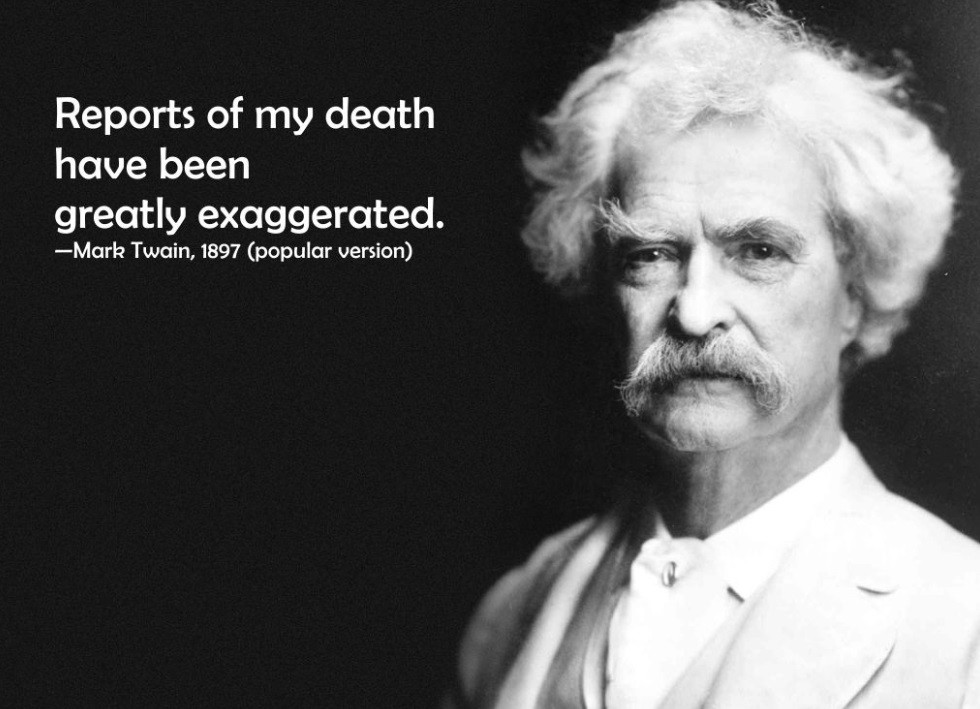MikeDunnAuthor on Nostr: Today in Labor History April 21, 1910: Mark Twain died. William Faulkner called him ...
Today in Labor History April 21, 1910: Mark Twain died. William Faulkner called him "the father of American literature." He grew up in Hannibal, Missouri, which provided the setting for “Tom Sawyer” and “Huckleberry Finn.” He apprenticed with a printer and worked as a typesetter, contributing articles to the newspaper of his older brother Orion Clemens. He later worked as a riverboat pilot before heading west to join Orion in Nevada. Twain was famous for his wit and brilliant writing. However, he also had extremely progressive politics for his era. Later in his life, he became an ardent anti-imperialist. “I have read carefully the treaty of Paris and I have seen that we do not intend to free, but to subjugate the people of the Philippines. We have gone there to conquer, not to redeem… And so I am an anti-imperialist. I am opposed to having the eagle put its talons on any other land.” During the Boxer Rebellion, he said that "the Boxer is a patriot. He loves his country better than he does the countries of other people. I wish him success." From 1901, until his death in 1910, he was vice-president of the American Anti-Imperialist League, which opposed the annexation of the Philippines by the U.S. He was also critical of European imperialists such as Cecil Rhodes and King Leopold II of Belgium, who attempted to establish colonies in African. He also supported the Russian revolutionaries fighting against the Tsar.
Many people have criticized him for his racism. Indeed, schools have banned “Huckleberry Finn.” However, Twain was an adamant supporter of abolition and said that the Emancipation Proclamation “not only set the black slaves free, but set the white man free also." He also fought for the rights of immigrants, particularly the Chinese. "I have seen Chinamen abused and maltreated in all the mean, cowardly ways possible... but I never saw a Chinaman righted in a court of justice for wrongs thus done to him." And though his early writings were racist against indigenous peoples, he later wrote that “in colonized lands all over the world, "savages" have always been wronged by "whites" in the most merciless ways, such as "robbery, humiliation, and slow, slow murder, through poverty and the white man's whiskey."
Twain was also an early feminist, who campaigned for women's suffrage. He also wrote in support of unions and the labor movement, especially the Knights of Labor, one of the most important unions of the era. “Who are the oppressors? The few: the King, the capitalist, and a handful of other overseers and superintendents. Who are the oppressed? The many: the nations of the earth; the valuable personages; the workers; they that make the bread that the soft-handed and idle eat.”
#workingclass #LaborHistory #marktwain #racism #feminism #imperialism #abolition #KnightsOfLabor #union #Literature #fiction #books #novel #author #writer [@bookstadon](https://a.gup.pe/u/bookstadon)

Many people have criticized him for his racism. Indeed, schools have banned “Huckleberry Finn.” However, Twain was an adamant supporter of abolition and said that the Emancipation Proclamation “not only set the black slaves free, but set the white man free also." He also fought for the rights of immigrants, particularly the Chinese. "I have seen Chinamen abused and maltreated in all the mean, cowardly ways possible... but I never saw a Chinaman righted in a court of justice for wrongs thus done to him." And though his early writings were racist against indigenous peoples, he later wrote that “in colonized lands all over the world, "savages" have always been wronged by "whites" in the most merciless ways, such as "robbery, humiliation, and slow, slow murder, through poverty and the white man's whiskey."
Twain was also an early feminist, who campaigned for women's suffrage. He also wrote in support of unions and the labor movement, especially the Knights of Labor, one of the most important unions of the era. “Who are the oppressors? The few: the King, the capitalist, and a handful of other overseers and superintendents. Who are the oppressed? The many: the nations of the earth; the valuable personages; the workers; they that make the bread that the soft-handed and idle eat.”
#workingclass #LaborHistory #marktwain #racism #feminism #imperialism #abolition #KnightsOfLabor #union #Literature #fiction #books #novel #author #writer [@bookstadon](https://a.gup.pe/u/bookstadon)
